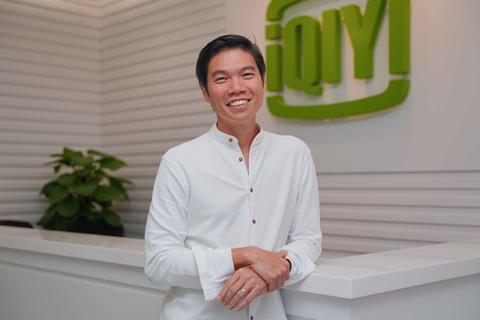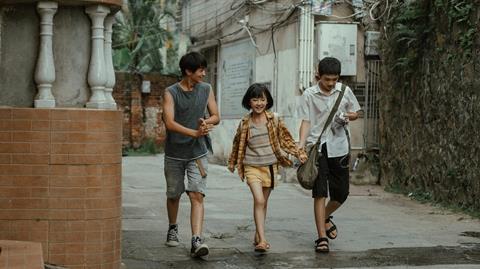
Long before Covid-19 brought the world to a shuddering halt, Chinese streamer iQiyi had started plotting its international expansion. Those plans began with the launch of an international app in June 2019 and a partnership with Malaysian media giant Astro towards the end of the year.
Focusing initially on Southeast Asia, iQiyi picked up the pace this year by establishing five offices in key markets across the region and appointing former Netflix executive, Kuek Yu-Chuang, as vice president, international business. It also made its international service available through browsers on a global basis, with subtitles in English, Spanish and several Asian languages.
Based in Singapore, Kuek is responsible for global strategic planning, marketing and business development, reporting to Yang Xianghua, iQiyi’s president of membership and Overseas Business Group, who is based in Beijing. Before working with Netflix, Kuek held posts with Yahoo, ICANN and as a trade negotiator and diplomat for the Singapore government, so has plenty of experience in public policy as well as tech.
Kuek says one of his first tasks is helping global audiences understand some aspects of Chinese culture and content, including how to pronounce his employer’s name (i-chee-ee, as the ‘Q’ sound in Chinese pinyin sounds like the ‘ch’ in cheese): “I don’t want people to avoid saying our name. I have a strange name so I know what that feels like,” he jokes. But more importantly, he wants the world to relate to Chinese programming.
Chinese and Korean content are in the vanguard of iQiyi’s international expansion strategy, followed by what Kuek describes as “hyper-local programming”, produced in local languages in markets across Southeast Asia. Korean drama needs little introduction as it already has a huge global fanbase, but Chinese drama and other TV genres are at the beginning of that journey. Kuek breaks iQiyi’s Chinese content down into three genres – suspense thriller, period romance and variety shows.
In China, iQiyi kickstarted the trend towards shorter run, high-quality dramas a few years back, launching five suspense thrillers this year, collectively known as ‘Lights On’, which have been breaking viewership records, winning awards and securing overseas distribution.
These include The Bad Kids, about three children who accidentally witness a murder and attempt to blackmail the perpetrator, which won the Best Creative Award at Busan’s Asia Contents Awards and was acquired by Japan’s Wowow. Singapore’s Singtel TV acquired three other series in the collection – Kidnapping Game, Sisyphus and The Long Night.

Along similar lines to Chinese neo-noir films such as The Wild Goose Lake and Ash Is Purest White, these series explore the dark side of human nature and societal issues in an imaginative way and within the bounds of Chinese censorship restrictions.
“If something has the potential to be trend-setting in China, we want to own that trend, and the work we have to do outside China is explaining it and carrying on with the content promise of that genre,” says Kuek. “Lights On has done remarkably well for us both in terms of reputation building as a story-teller, but also monetisation.
iQiyi’s period romances are aimed at younger audiences, shows such as Blooms Of Ruyi Pavilion and Dance Of The Sky Empire, reminiscent of YA content in the West, but against a period setting.
“People think of [Chinese] period drama as martial arts, lots of fabric, lush sets – we take all that and juxtapose it with very contemporary storylines, bringing female empowerment and modern relationships into the mix,” explains Kuek. “We’re seeing the genre resonate well in our Southeast Asian markets, especially Thailand and Vietnam.”
The streamer is also attempting to innovate in the variety show genre, already huge in China, with shows such as Youth With You, where winners often break gender and other stereotypes, and Dimension Nova, China’s first variety show to feature virtual contestants
But while this China-produced content is starting to find an audience in the rest of Asia, iQiyi has also recognised that Chinese-speaking audiences outside the mainland are culturally different and has also started producing Chinese-language shows that reflect this ‘huaqiao’ (i.e. overseas Chinese) culture.
Following on from Little Nyonya, iQiyi’s remake of a popular Singapore period drama, iQiyi International has put into production two further shows set in 1930s and 1940s Malaya – Ferrymen: Legends Of Nanyang, starring Lawrence Wong (Story Of Yanxi Palace), which recently wrapped at Iskandar Malaysia Studios, and Sisterhood, which recently started shooting.
Kuek explains that mainland audiences are fascinated by the food and culture of overseas Chinese – which in some Southeast Asian nations goes back a few centuries – “but a lot of what we’re trying to do goes beyond the Chinese community as well. With production values rising, there are products that will find a global audience.”
Beyond Chinese content in Southeast Asia, iQiyi is also acquiring and starting to produce content in local languages in Malaysia, Thailand, Philippines and Indonesia. It recently struck a deal with Malaysia’s Primeworks Studios, covering six drama series, and picked up Thai series Daughters, an adaptation of a 1994 film by Prince Chatrichalerm, directed by his daughter.
Korean wave

Korean dramas are an obvious choice for any streamer that is trying to go global. At last week’s Asia TV Forum & Market (ATF) Online, iQiyi said it has launched 29 K-dramas on its international platform in 2020 and announced its first Korean original production, My Roommate Is A Gumiho, co-produced with Korea’s Studio Dragon and JTBC Studio.
It’s an intensely competitive space, with not just Korean companies like CJ ENM pushing Korean content internationally, but also global streamers including Netflix, Amazon and Rakuten Viki and regional streamers like Hong Kong-based Viu. Chinese streamers face the additional complexity of Korean content being effectively banned in mainland China since 2016.
However, Kuek says iQiyi can compete by going the extra mile for the Korean content on its international platform, such as Backstreet Rookie, A+E Networks first foray into Korean drama, which iQiyi has global rights to outside Korea.
“What we promise Korean producers when they put content on our platform is that they’re going to get our full marketing attention,” Kuek explains. “So for a show like Backstreet Rookie, we don’t just make it available to US audiences, we position is as one of our leading titles with marketing campaigns and influencers promoting it in the US. We work harder than some other streaming platforms might.”
Kuek adds that he looks forward to a time when the international distribution of Chinese content is equally as competitive. “We’ve found in Southeast Asia that Korean content immediately finds an audience and we’re doing our best to get mindshare for Chinese content as well. In a lot of these markets, when we do our social listening, we hear our fans start to talk about Korean and Chinese stars interchangeably and we think that’s a good sign.”
Covid impact
Of course cultural barriers are not the only issue iQiyi faces as it sallies forth globally. In the current political environment, any international expansion of Chinese companies could face roadblocks, as Bytedance’s TikTok platform has recently in the US. Meanwhile, local legislators recently passed a law banning mainland China streaming services in Taiwan.
Then on the business front, while the pandemic prompted global audiences to turn to streaming services en masse, it also cut into ad revenues (like other Chinese streamers, iQiyi’s business model is a combination of AVOD and SVOD) and slowed down production of new content, which in turn put the brakes on new subscriptions.
“Our third quarter earnings were hit by fewer theatrical releases eventually coming online, so without new content you’re faltering, but we saw that rebound in the fourth quarter,” Kuek explains. “Over and above that, we’re seeing some heartening developments in terms of production. Malaysian production is ongoing and our mega title Luoyang [historical drama starring Wang Yibo] just went into production in China.”
With many countries now starting to roll out vaccines – China’s Sinovac recently said it hopes to manufacture 600 million doses by the end of the year – Covid-19 could hopefully soon become a thing of the past. But streaming is here to stay, along with growing international acceptance of foreign-language content.
“Covid won’t last forever, although there’s a new normal, and we have to come up with innovations,” Kuek says. “But we’re also preparing for a world where we’re all travelling again and the festival circuit is back up.”






![The Brightest SunScreen[Courtesy HKIFF]](https://d1nslcd7m2225b.cloudfront.net/Pictures/274x183/3/5/0/1448350_thebrightestsunscreencourtesyhkiff_312678.jpg)


















No comments yet